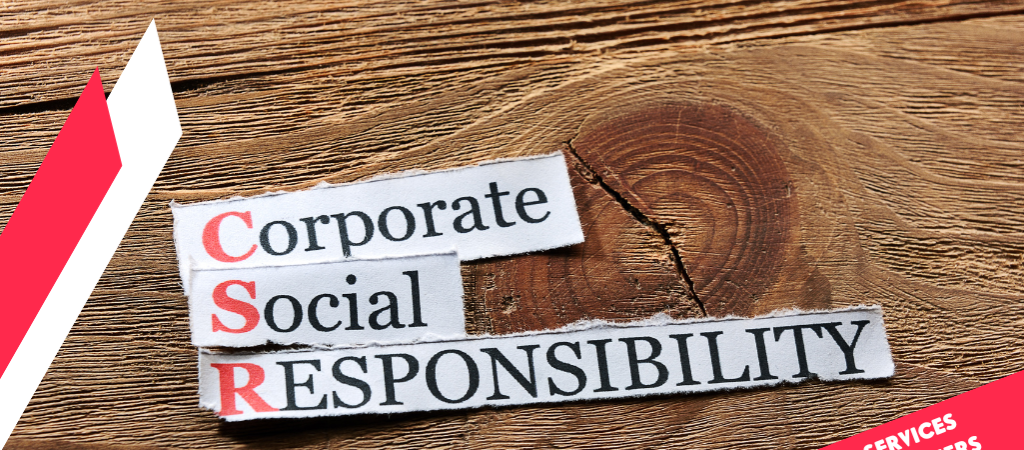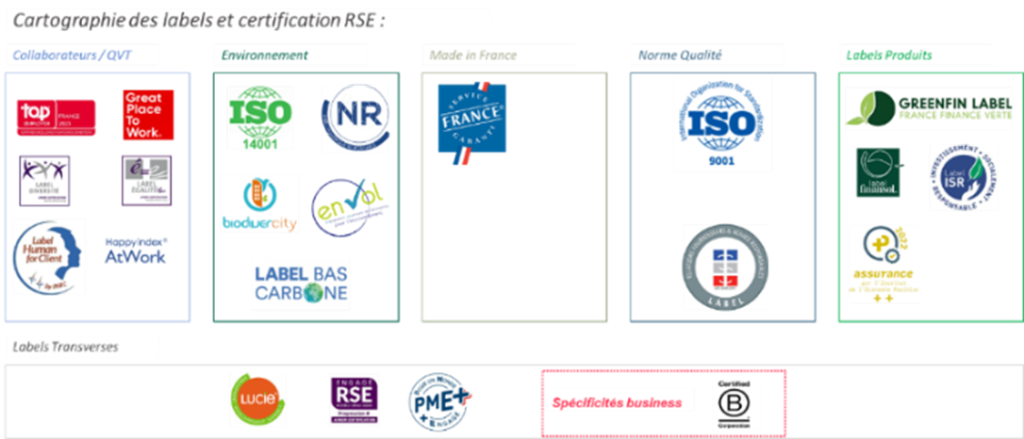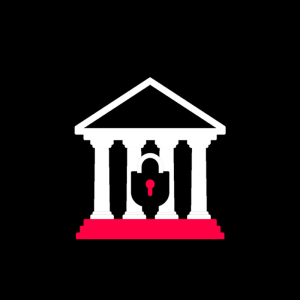A specific CSR label certifies that a company or product complies with a specific standard. But how do mutuals, banks and insurance companies choose between CSR labels? That's the question our experts in the Financial Services division are here to answer.

Banks and insurance companies' interest in obtaining a CSR label
We are facing major societal and environmental challenges (climate risks, geopolitical and economic issues, impoverishment...). Financial players are key to meeting these challenges. Indeed, they have a duty to integrate responsible practices towards their stakeholders. They also have a social role to rethink, as those responsible for allocating financial resources that have an impact on society and the environment.
This corporate responsibility is reflected in our stakeholders' demands for greaterpositive impact from :
- customers ;
- of members ;
- employees ;
- new recruits ;
- the general public;
- associations ;
- general interest structures...
In addition to societal pressure, the tightening of regulatory issues is also weighing on companies (CSRDDIRECTIVES, SFRD, European Taxonomy).
Several noteworthy CSR initiatives among financial services players
Faced with this growing pressure and the social role to be assumed, a number of initiatives are being developed among financial players:
- development of the Mission Company ;
- Net Zero trajectory ;
- labeling and certification of all or part of its activities...
In fact, a CSR label appears to have a number of advantages for the company's stakeholders:
- increase customer awareness ;
- enhancing attractiveness ;
- customer loyalty.
It may concern a specific activity (e.g. HR policy, Procurement , quality standards, etc.) or involve the entire company with cross-functional labels such as the LUCIE label or B Corp.
Several financial players have already been certified by these transversal CSR labels. These include Caisses du Crédit Agricole, Caisses d'Epargne and Banques Populaires, while other initiatives continue to multiply.
CSR label: accelerating banks' transformation or rewarding them?
Objectives and principles of CSR labels in the banking and insurance sector
It's essential to understand what CSR labels are all about, and what their objectives are.
CSR certification, often based on the ISO 26000 standardstandard, includes a wide range of specific and cross-functional labels.
A specific CSR label attests to a company's or product's compliance with a specific standard, such as transparency in the investment of savings (e.g., the Greenfin label): Greenfin labellabel), employee well-being (e.g. Top employeur) - more examples can be found in the illustration opposite.
A transverse label, on the other hand, certifies a company's overall compliance with CSR standards by assessing its performance on a wide range of social, environmental, economic and ethical criteria. Among these labels is the Lucie label, accompanied by a CSR learning process, obtained by Banque Populaire Aquitaine Centre Atlantique, for example.
Mapping CSR labels and certification

Which CSR label to choose?
The selection process for a CSR label is based on several criteria, guiding companies towards well-considered strategic choices.
-
The notoriety of the label and the difficulty of obtaining
play a key role, as established recognition of the label reinforces the credibility of the company's CSR commitment. -
The scale of the resources to be allocated to certification
The workload and financial investment must be assessed in advance by the company to enable it to commit to the certification process. -
The harmony between the label and the company's DNA, core values and global strategy
guarantees sincere and consistent support.
A CSR label that reflects the company's maturity in terms of Corporate Social Responsibility
CSR labeling can be implemented at different stages of Corporate Social Responsibility maturity within an organization.
We are seeing a trend among bancassurance players to opt for CSR certification in order to close the gap in their CSR approach.
It is interesting to note that companies such asAxa and Crédit Agricole, although not labelled, have made substantial CSR commitments. They go so far as to analyze their customers' portfolios to actively support the establishment of a decarbonization trajectory. For these companies, labelling does not seem to be a necessity, as they are already well advanced on the CSR front.
Increasingly, companies are recognizing CSR certification as a powerful gas pedal of their CSR strategy. Indeed, organizations committed to CSR certification enjoy a number of strategic advantages.
A STRUCTURING FRAME OF REFERENCE
The CSR label provides companies with a guide/methodology for structuring their CSR approach, covering social, societal and environmental aspects.
This helps to harmonize and optimize internal CSR initiatives.
ATTRACTIVENESS AND COMMITMENT
It enhances the attractiveness of the company as an employer (employer branding) and encourages employee commitment. Indeed, employees are increasingly aware of their employer's social and environmental actions.
INTEGRATION INTO
A COMMUNITY
By obtaining a CSR label, companies join a dynamic community, an ecosystem that fosters BtoB opportunities.
This integration takes the form of participation in local working groups. Other examples include carbon initiatives, impact finance activities, and referrals between certified companies as evidence of a collective approach.
FOR SHARED
MODELS
It provides mutualist models with a centralized communications channel to highlight their commitment to society.
STANDARDIZATION
OF PROCESSES
CSR labels encourage the standardization of purchasing processes and responses to calls for tender. They emphasize social and environmental impact, which in turn enhances competitiveness.
MARKET RECOGNITION
CSR certification brings recognition in the marketplace. The CSR label thus obtained becomes a communication tool to enhance the value of the company's approach in the eyes of its stakeholders, whether members, customers, partners or investors.
A CSR label is different from the status of a company with a mission
Thus, obtaining a CSR label, while not an end in itself, plays an essential role in accelerating the implementation of an integrated CSR strategy. It provides a structured framework for social, societal and environmental commitments. What's more, it facilitates day-to-day management, and encourages a process of continuous CSR improvement.
It should also be emphasized that the CSR label should in no way be confused with the status of "company with a mission". "mission-driven companyan increasingly popular approach that implies greater responsibility towards society. This notion was introduced by the Pacte law of May 22, 2019, and offers companies the opportunity to clearly display their raison d'être in their articles of association. It also makes it possible to display specific social and environmental objectives that companies undertake to pursue as part of their activities. These elements must also be declared to the clerk of the commercial court of the relevant jurisdiction.
In this article, we take the opportunity to present to you our convictions and methodology for CSR certification support.
Further information

CSR labels: how can iQo help you?
Obtaining a CSR label can be a daunting task for companies embarking on their journey without a methodology. A specific CSR label attests to the

How should banks support AgriTech financing?
Banks have a key role to play in supporting the financing of AgriTech in France. French agriculture as a whole is faced with a number of challenges

Banks face up to their positive impact transformation
Find out why banks need to step up their "Positive Impact" initiatives. Consuming ethically has become a widely shared concern for many people.

